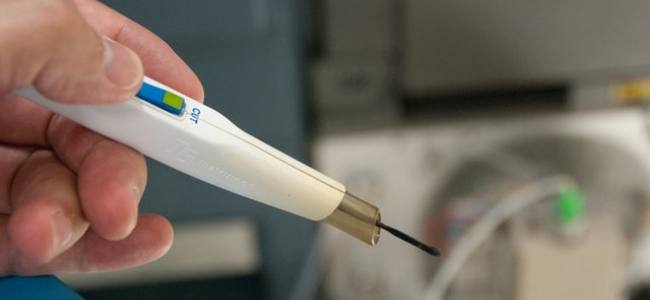
iKnife, the first device that recognizes cancer cells
You could know immediatly if the tissue that you’re cutting is cancerous, or not. This revolution is possible thanks to iKnife, the revolution invented by researchers at London’s Imperia College. Scientists developed an electrosurgical knife that recognizes cancer cells as it cuts through them. During an operation, a surgeon uses an electrosurgical knife to remove tissue identified as cancerous.
In the first study to test the invention in the operating theatre, the “iKnife” diagnosed tissue samples from 91 patients with 100 per cent accuracy, instantly providing information that normally takes up to half an hour to reveal using laboratory tests.
Using the iKnife the heat and smoke released during tissue vaporization is instantly analyzed in a device specifically developed for the task. In the past, this smoke was simply sucked away by extraction systems—until scientists discovered that it contains a wealth of biologically relevant clues.
By analyzing the smoke, the device can determine whether the cancerous tissue is benign or malignant. The analysis takes just three seconds, enabling the doctor to decide on the spot whether additional tissue should be removed. The iKnife’s creators hope the device will reduce the amount of healthy tissue extracted, giving patients a better chance for a quick and healthy recovery.
The iKnife is based on electrosurgery, a technology invented in the 1920s that is commonly used today. Electrosurgical knives use an electrical current to rapidly heat tissue, cutting through it while minimising blood loss. In doing so, they vaporise the tissue, creating smoke that is normally sucked away by extraction systems.
The inventor of the iKnife, Dr Zoltan Takats of Imperial College London, realised that this smoke would be a rich source of biological information. To create the iKnife, he connected an electrosurgical knife to a mass spectrometer, an analytical instrument used to identify what chemicals are present in a sample. Different types of cell produce thousands of metabolites in different concentrations, so the profile of chemicals in a biological sample can reveal information about the state of that tissue.
In the new study, the researchers first used the iKnife to analyse tissue samples collected from 302 surgery patients, recording the characteristics of thousands of cancerous and non-cancerous tissues, including brain, lung, breast, stomach, colon and liver tumours to create a reference library. The iKnife works by matching its readings during surgery to the reference library to determine what type of tissue is being cut, giving a result in less than three seconds.
The iKnife currently costs £ 200,000 to manufacture, but its developers—who have already tested the device on more than three hundred patients with great success—expect the cost to drop dramatically when it goes into commercial production.



